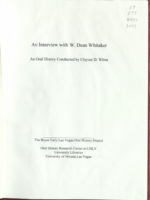Search the Special Collections and Archives Portal
Search Results

Transcript of interview with Rowena Gonzalez by Michael Boyd, March 1, 1977
Date
Archival Collection
Description
On March 1, 1977, Michael Boyd interviewed Rowena Gonzalez (born 1946 in Wichita Falls, Texas) about her life in Nevada. Gonzalez first talks about her family background and residential history before discussing the way of life in Texas and eventually in Las Vegas. Several topics covered in the interview include Gonzalez’s recollections of the atomic testing, the building of the Hoover Dam, and Howard Hughes. The two also discuss tourism, the properties on the Strip and in Downtown Las Vegas, and early means of transportation.
Text

Transcript of interview with Celia Rivero Grenfell by Patricia Hollard, March 31, 1977
Date
Archival Collection
Description
On March 31, 1977, Patricia Holland interviewed Celia Rivero Grenfell (born 1926 in Las Vegas, Nevada) about her life in Southern Nevada. Grenfell first talks about her family background in Mexico and later describes her family’s restaurant business. She also describes her education, recreational activities, Downtown Las Vegas, and Helldorado. The two also discuss racial segregation and prejudice, the El Rancho Vegas, Lorenzi Park, early churches, environmental changes, early air conditioning, and Grenfell’s early work in a laundry business.
Text

Transcript of interview with Dr. Jack Lund Schofield by Suzanne Becker, January 13, 2009
Date
Archival Collection
Description
In the dusty border town of Douglas, Arizona, Dr. Jack Lund Schofield was born in the family home in 1923. Due to the economic woes of the Great Depression, the Schofield family moved several times until 1937—the year that Jack's father took a position as a tungsten broker and moved his family of five children to Nevada. For Jack, who was ready to start high school, the move from Phoenix to Las Vegas with a small population of 5000 was a shock. However, it did not take the gregarious Jack long to make friends at Las Vegas High School. He played sports and was a Golden Glove boxing champion. As Jack's high school years drew to an end, two major events occurred: he met his future wife and World War II began. He proudly highlights his service as a fighter pilot in both WWII and the Korea conflict, his family genealogy, and his devotion to being an excellent educator, businessman, family man, and politician. In 1995, he earned his doctorate in education at the age of 72. His resume includes being an elected official, serving on the Board of Regents and having a middle school named after him. Jack and his wife, Alene, have resided in the John S. Park Neighborhood for over 50 years and describes his affection for the neighborhood and some of the changes that have occurred.
Text

Transcript of interview with Bud Weil by Claytee White, December 9, 2003
Date
Archival Collection
Description
Bud Weil worked as a disc jockey in Mexico after serving in the military during World War II. In 1947, he moved to Las Vegas to work at KLAS but after two days he was job hunting. His search landed him at KENO, a radio station owned by Max and Laura Belle Kelch. His was an interview show that afforded him entree to stars performing in town. The list of his favorite interviews includes Sophie Tucker, Sammy Davis, Jack Benny, The Mills Brother, Rosemary Clooney, Leno Home, Joey Lewis and many others. In 1955, he became restless, left the career in broadcasting, and joined Max Kelch as a partner in a new venture for Las Vegas - Musak. This enterprise took him to the doors of every business in town and shortly, he knew everybody. He uses that knowledge in this interview to talk about all aspects of life as the town grew over the years. Today he is a senior statesman of our town, enjoying everything about Las Vegas except the traffic.
Text

Transcript of interview with Dean Whitaker by Claytee White, April 5, 2010
Date
Archival Collection
Description
William Dean Whitaker was born in 1925 and raised in a suburb of Los Angeles, California. Dean, as he is known, talks briefly about his parents and his brothers, for his youth quickly ended when he joined the Air Force and became an aviation cadet once he had turned 18 years old. The year was 1943 and World War II was raging. He became a member of the 398 th Bomb Group and flew twenty missions before being captured by the Germans. In this oral history, Dean talks with vivid recollection of the day he was captured and details of being a POW in Germany. Among his anecdotes are those of his mother's unwavering belief that he would return home, the humanity of a German soldier, and of meeting Gen. George Patton. Included are photos and excerpts from his personal history of his life during the war. Dean and his wife Lucille moved to Las Vegas in 1990.
Text

Transcript of interview with Cheryl Leonard by Claytee White, February 12, 2013
Date
Archival Collection
Description
First arriving in Las Vegas as an infant, Cheryl Leonard's young life included a brief sojourn in Southern California before returning to Las Vegas in 1954. After attending local elementary and middle schools, she started at Rancho High during the day, and working at the Huntridge theater in the evenings and during the summers. More than just work, though - in this interview, Cheryl recalls school activities from parades to pep club, participating in Helldorado, hanging out with her friends at the Blue Onion and shopping on Fremont Street. After graduation, Cheryl returned to California to attend school before coming back to Las Vegas and taking a job with the Central Telephone Company. This was followed by a brief stint working at the Nevada Test Site before she married in 1964 and concentrated on raising her own daughters in a rapidly growing and changing Las Vegas.
Text

Interview with Charles McWilliam, January 11, 2005
Date
Archival Collection
Description
Text

Interview with Joyce Anne (Reese) Parkhurst, November 27, 2004
Date
Archival Collection
Description
Text

Interview with Jacob "Chic" Hecht, May 11, 2004
Date
Archival Collection
Description
Text

Interview with Bruce Lee Wilhelm, June 22, 2005
Date
Archival Collection
Description
Text
